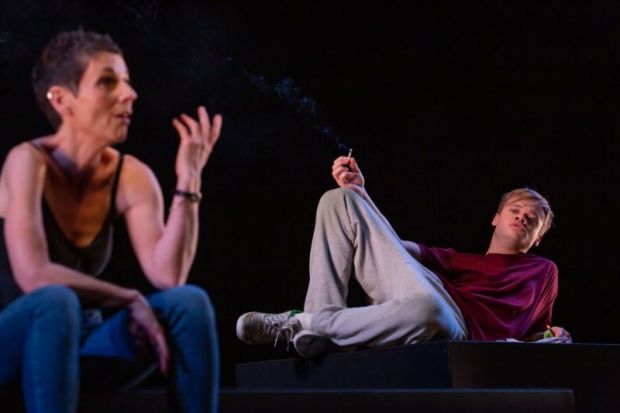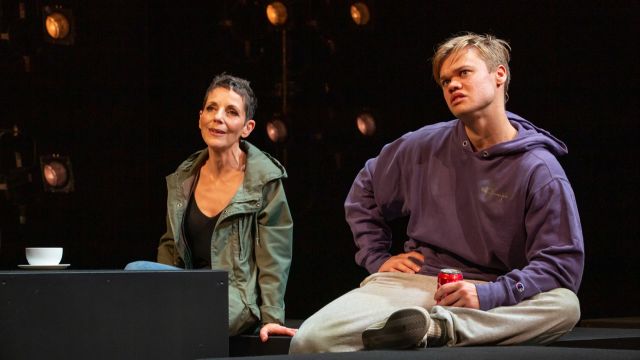Mouthpiece
An emotional Director, Lee Lewis took to the stage on opening night to thank the audience for attending her first production at QPAC, and Queensland Theatre’s (QT’s) return to live theatre after 8 months of lockdown. Her heartfelt speech was a reaction to a gentle standing ovation that proved audiences may have been slightly hesitant, but were ultimately happy to be back in theatres and enjoying live performances of the robust calibre delivered by Christen O’Leary and Jayden Popik in Mouthpiece. A Scottish play about a suicidal middle-aged playwright forming a friendship with a young unemployed artist may seem a strange choice to entice people back into the theatres. However, while touching on class differences and the effects of austerity on communities, at its heart, this play is about storytelling and the power of art, making it an astute choice to invite audiences back into a darkened room.
At the launch of QT’s 2021 season, Creative Director, and Mouthpiece Director, Lee Lewis said her main focus was to get actors back on stage. This play certainly showcases the abilities of its two performers, who run a 90-minute marathon together. O’Leary draws on her considerable stage experience to steep her character, Libby, in theatrical tropes: as a writer, Libby has issues with creative block, but she knows how to survive, and openly reveals her techniques. These tricks are reinforced, projected in American Typewriter font on the sets, in simple but effective stage and lighting design by Renée Mulder and Ben Hughes. Sound Designer, Tony Brumpton, uses a classic 90’s grunge soundtrack to underline the generation gap between the characters. In his QT debut, Popik shows refreshing maturity as a performer, and is energetic and engaging as the troubled but bright Declan, walking the high-wire between emotional trust and easy aggression as he struggles to use his visual art to help him through his days.

O’Leary’s Libby explains to Popik’s Declan that she feels the theatre is important because, when they are watching a good play, the audiences’ hearts beat as one. On opening night, the performers and audience felt slightly tentative – like a meeting of lovers who haven’t been together for some time. Will it work out? What could go wrong? While the actors were clearly enjoying being back on stage, the pace got off to a nervous start – but the one-act format kept the audience engaged and helped the actors quickly get in synch. This small crease will iron itself out now that the post-lockdown ice has been broken. The humour picks up in the second half of the piece, which sees the characters battling for their own answer to the questions: Does Libby have the right to borrow Declan’s story for her art? The performers work well together, and the characters’ final confrontation is a satisfying payoff.
While Dialect Translator, Phil Spencer, must have had fun working with Hurley’s original, the earthy Anglo Saxon language that sounds so funny with a Scots lilt comes across as aggressive and sharp in the down-to-earth Aussie vernacular and could undermine some of the essential humour of the piece. Scottish playwright Kieran Hurley is neither a middle-aged woman nor an unemployed young man living on the poverty line. He is a clever writer who openly toys with the on-stage format and our tendency as audiences to assume the characters’ trajectories and our desire for a suitably dramatic ending. But characters don’t fit into types and endings don’t always work out. So, in the end, does art help Libby and Declan? Appropriately, that is left for the audience to decide.
Beth Keehn
Photographer: Stephen Henry

Subscribe to our E-Newsletter, buy our latest print edition or find a Performing Arts book at Book Nook.

